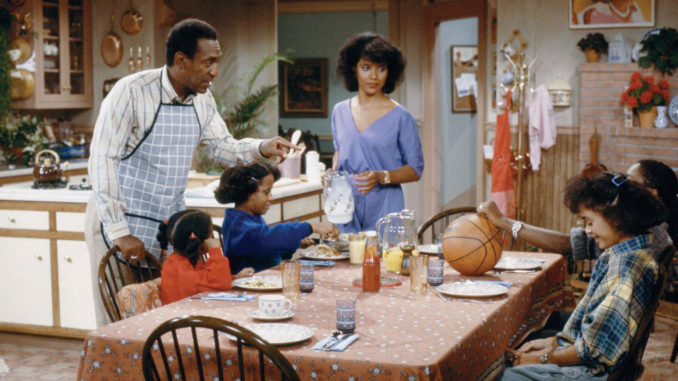
“How The Cosby Show redefined the American family for an entire generation”
Introduction: When The Cosby Show premiered in 1984, it didn’t just change the way African-American families were portrayed—it reshaped the American family in pop culture. The Huxtables were unlike any family seen on TV before: educated, successful, and deeply loving. They were a model of what a modern American family could be, and their portrayal in The Cosby Show set a new standard for what viewers expected from family sitcoms.
The Ideal American Family? Before The Cosby Show, the typical portrayal of an American family on TV often leaned on traditional norms. Fathers were portrayed as authoritative figures, and mothers were seen as homemakers. Children were rebellious teens who eventually came around to the lessons of their parents. While these representations had their place, they didn’t always reflect the realities of growing up in a changing world. The Cosby Show offered a more progressive version of the American family.
Dr. Huxtable was a professional, well-respected doctor, and his wife, Clair, was a lawyer. Together, they demonstrated a balanced approach to both careers and parenting. They were well-educated, financially stable, and deeply committed to their children’s well-being. The Huxtables didn’t just fit into traditional family sitcom molds—they expanded and refined the idea of what a family could be.
Challenges and Triumphs: Though the Huxtables were a picture of success, the show didn’t shy away from depicting real-life challenges. The series dealt with issues like adolescence, teenage rebellion, sibling rivalry, and academic struggles, all while maintaining a tone of love and warmth. These challenges were faced with humor, intelligence, and compassion—qualities that made the Huxtable family feel both aspirational and accessible.
The show proved that family dynamics could be complex and messy but still rooted in love and support. Dr. Huxtable’s interactions with his children, whether humorous or serious, were the backbone of the show. These relationships showed how families could navigate struggles together and come out stronger on the other side.
The Show’s Legacy: The Huxtables’ impact on TV was profound. They became the template for future family sitcoms, influencing shows like Full House, The Fresh Prince of Bel-Air, and Modern Family. The Cosby Show set a new standard for what family sitcoms could be: intelligent, relevant, and multi-dimensional.
Conclusion: The Cosby Show redefined the American family in pop culture, offering a more nuanced, sophisticated version of what it could look like. The Huxtables weren’t just an ideal—they were a reflection of what families could aspire to be: loving, educated, successful, and supportive. The show’s legacy continues to influence how families are portrayed on television, and its impact will be felt for generations to come.
